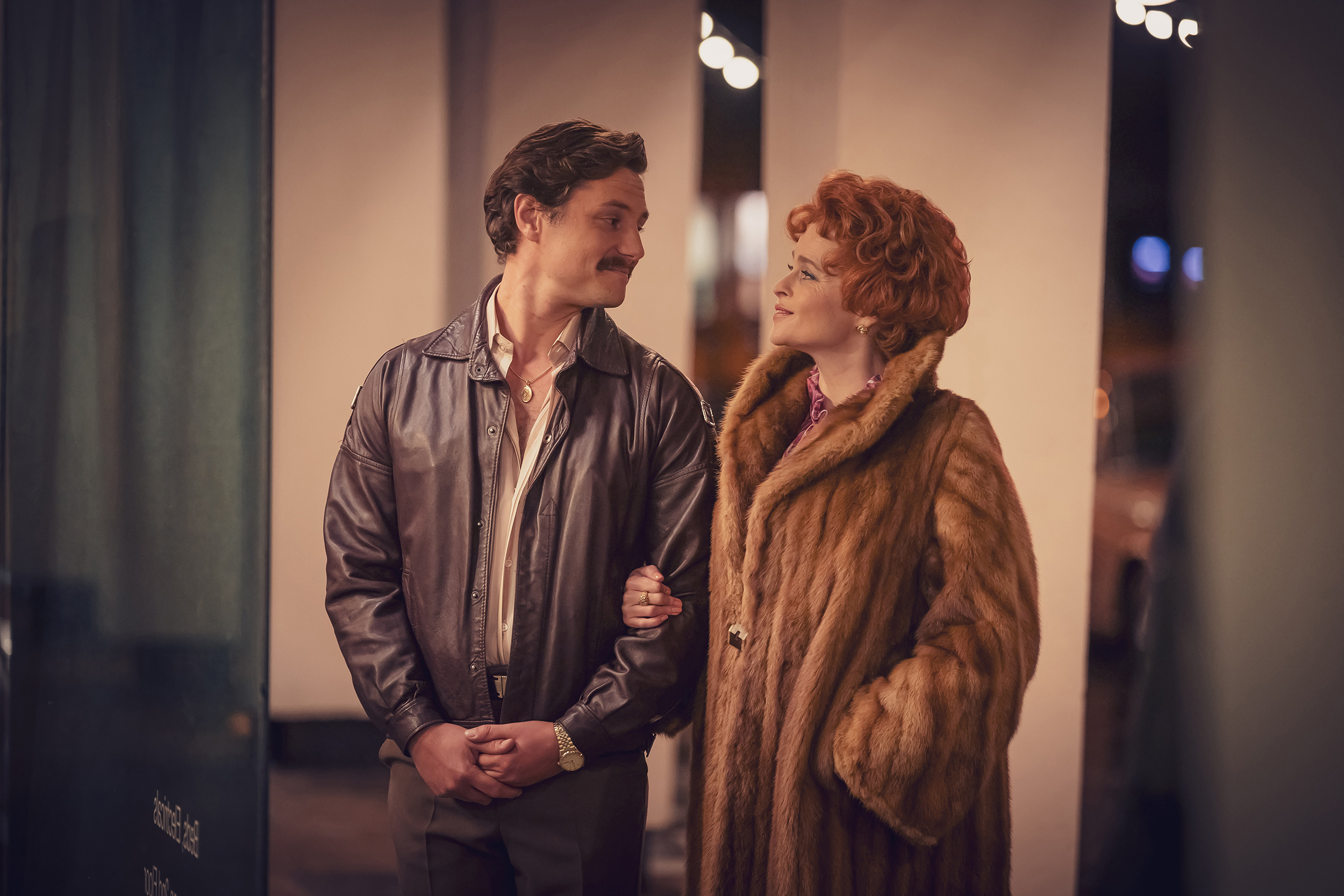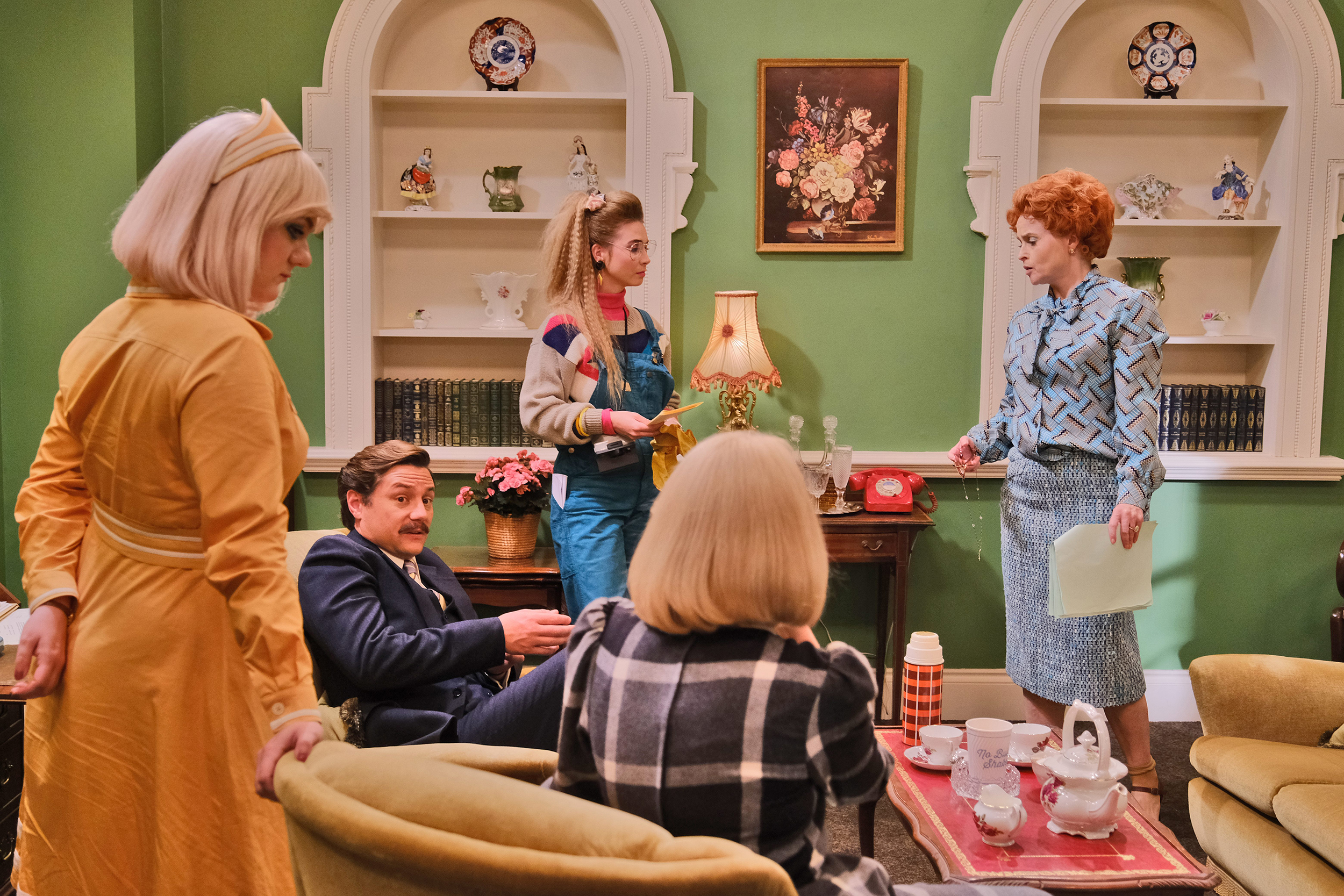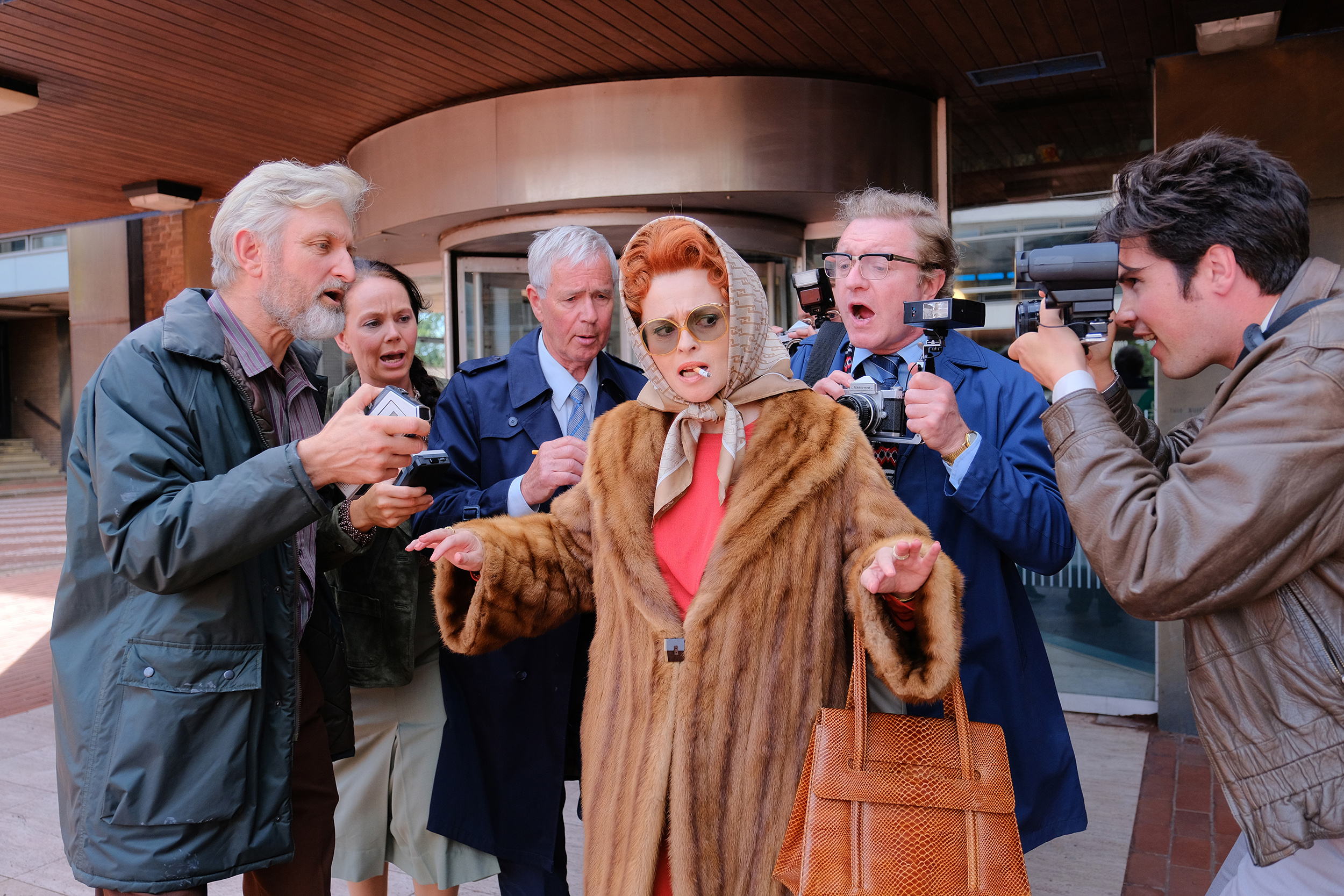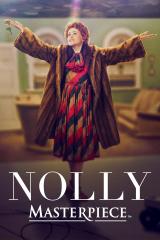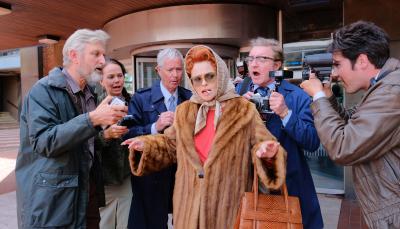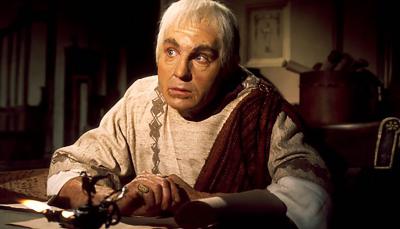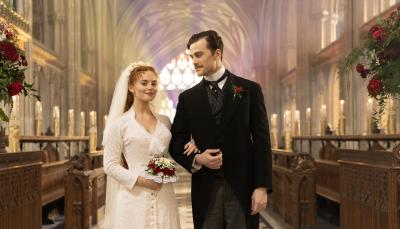'Nolly' Premiere: “What A Drag It Is, Getting Old”
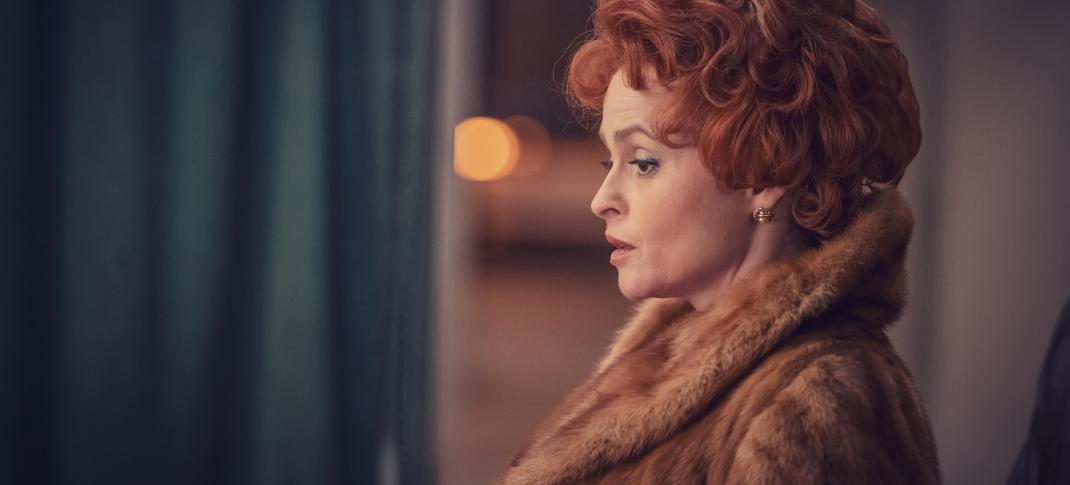
Helena Bonham Carter as Noele Gordon in 'Nolly'
Quay Street Productions/Masterpiece
Nolly, a three-part miniseries about the latter career of Noele Gordon, is one of those shows that has a lot going for it but doesn’t quite stick the landing. At least, not for a contemporary American audience. We know extremely British shows can become much-loved classics for American viewers, often by leaning as far into their idiosyncrasies as possible. There’s universality in specificity. Think Derry Girls: set in 1990s Derry, with the Troubles in full swing – the hyper-sonic accent, the very particular humor, and concerns so integral to that place and time – but Lisa McGee’s voice and perspective are so idiosyncratic, everything in Derry Girls feels like it’s rooted in reality, so it’s easy to delight in their oddities because we relate to the universality of their lives as teens.
This is not a mark that Nolly hits consistently, and more’s the pity, because the world is ready (maybe even hungry) to revisit and re-assess the lives and contributions of women who committed unforgivable sins such as being opinionated and growing old. What puts Nolly on some wobbly footing early on and never lets it fully right itself is what got lost in translation from its production in Great Britain to its arrival here, namely, context.
It’s absolutely possible to create a lightly fictionalized biographical series for an audience that includes both viewers who have prior knowledge of the subject and those who’ve never heard of whoever the series is about. Nolly assumes its audience already knows about the fascinating, complex woman whose influence on daytime TV we continue to feel today. If you’re one of the many whose first introduction to Nolly Gordon is Nolly, drop everything and hop on over to my colleague Ani’s first-rate explainer about Gordon’s life and times. It’s a quick read and will furnish the context you need to enjoy the miniseries as a whole.
We first meet our heroine in 1938, as a beautiful, self-possessed young woman (Silvia Presente) peering around the small TV studio where she’s sitting for a screen test. A courtly Scottish man ( who turns out to be John Logie Baird) and his team are murmuring the comforting patter of the highly competent as they attend to all the details of the lights that need adjusting, the many switches that need flipping, and the camera that requires focusing. This young woman will be the first woman in the world to appear on colo(u)r tv, and as she informs us via direct address to the camera, her name is Noele Gordon. People (that is, we) call her Nolly.
What we don’t learn is that after the end of World War II, Nolly left England to study television production at NYU and, after returning home post-degree, went on to create many of the elements of what we now consider standard breakfast-show and midafternoon TV. Knowing this makes so many scenes of this episode dramatically more sense than before I knew this fact. Without this knowledge, I had an impression of Nolly as a person who’s great at being famous, very good at her job, and also kind of a micro-managerial holy terror as a colleague: imagine Lady Catherine de Bourgh in a fur coat.
With it, I see her routine rewriting and reblocking of scenes on her soap opera, Crossroads, as the work of an exceptionally gifted unpaid producer/director. Likewise, her zippy, memorable explanations about how the cast and crew approach rehearsals and shooting each episode are some of Nolly’s most engaging and interesting scenes. These moments put to excellent use the walk-and-talk style of exposition popularized by Aaron Sorkin in The West Wing.
Other moments further illuminated by understanding Nolly’s substantial technical expertise include every time we’re shown her knack for problem-solving. In addition to the rewriting and reblocking she does on the fly, we’re shown a pivotal moment in 1975 where she transformed a crisis into a blessing. Producer-director Jack Barton (Con O’Neill) is in a lather over how the thousands of fans who have gathered outside the church where they’re shooting her character Meg’s wedding because they’re all in-shot, and it’s disrupting the planned shoot. Nolly, unbothered, suggests that he allow those people to remain on camera, as it will furnish an extra note of genuine enthusiasm and joy in the episode.
Throughout the episode, Nolly is in problem-solving mode. But her skills begin to break down at the midway point as she struggles to process the news that ATV won’t negotiate a new contract with her, her attempts to strategize a communications strategy around it, and her conversation with Jack, where he remains noncommittal about how Meg will exit Crossroads. Does Meg have to die? “We’ll just have to wait and see,” he says. Maybe Jack is being a slippery little jerk because his ego demands that he twist the knife a bit; maybe he hasn’t given it much thought and is trying to cover that up. Whatever the root cause, these scenes highlight the limits of Nolly’s savoir-faire and knack for problem-solving. The powers that be are a blank wall, and she’s run out of dynamite.
Also going unsaid (or in some cases, said, but not given quite the expository or narrative weight they need to make a substantive impact) are Nolly’s largely joyful status as a queer icon and her deep well of melancholy. These are intertwined in several ways. Her sacking happens in 1981, as the horrors of the HIV/AIDS pandemic were beginning to be known outside of the gay communities it was decimating.
The triple cocktail of medications that transformed HIV/AIDS from a guaranteed death sentence to a chronic illness didn’t arrive until the mid-1990s, and by the time of Nolly’s death in 1985, she’d have lost many friends, colleagues, and fans. In some ways, this miniseries feels like creator and writer Russell T. Davies’ attempt to provide a lively history lesson for the queer youth of today about a woman who meant a great deal to elders they’ll never meet.
Some of the series’ liveliest moments are those where Nolly interacts with her still-adoring public. She’s so good at being famous! She knows right down into her bones that her fans think they know her, that she scarcely knows them, that all they want is to tell her how much they enjoy her work, and that being gracious about it (even when they rave incorrectly about her performance in Crossroads’ rival soap, the still-running Coronation Street) is the least she can do. Giving fans the ten seconds it takes to issue a compliment and accepting it with good (and even saucy) humor is a gift to them, not to her. These moments, which seem to take place often with her visibly, casually queer work bestie Tony, are imbued with a campy verve. It’s fun!
And yet, it’s a reminder of a time – her time – that’s receding into the rearview faster and faster with each passing day. In quieter moments, Nolly reflects on how much she misses her late mother, her co-star Roger (who played her son, Sandy, for 17 years on Crossroads), and her as-yet-unnamed former lover. Being alive is wonderful, but outliving people she loved, who seem to have brought out the best in her and reminded her of who she was when she wasn’t being Famous Nolly, is a rough business, and not for the faint of heart.
Nolly’s Fabulous Knick-Nacks
Just a handful of fun odds and ends of note:
- The score is so good! The section played over the rewrite/rehearsal scene is a jazzy little drum solo, enlivened by the sounds of a typewriter, that would not feel out of place on the score of The Royal Tenenbaums, which also featured typewriter sounds in Mark Mothersbaugh’s score.
- Come to think of it, Nolly’s fur coat is a dead ringer for the one Gwyneth Paltrow wears as Margot Tenenbaum in The Royal Tenenbaums! Purposeful or not, it’s a fun little resonance between the two pieces.
- I’d like to issue some extra credit points to the skillful and amusing use of re-creations of original scenes from Crossroads and the use of that visual style when the actors, in costume and moving in and out of character, discuss Nolly’s firing / Meg’s departure at length. The contrast between Soap Opera Visual Style (still thriving wherever soaps are streaming today!) and the more naturalistic style we’re used to from contemporary TV is a hoot.

